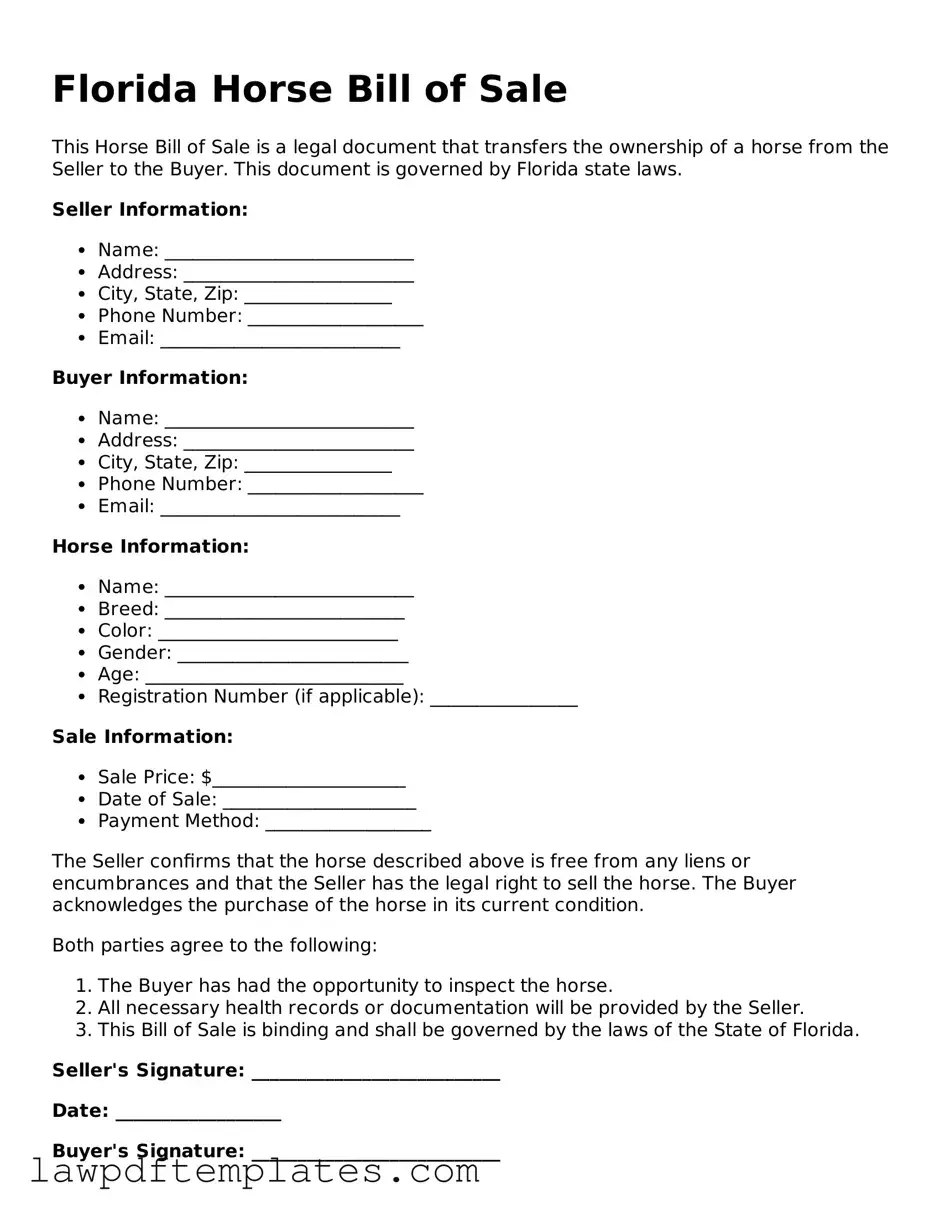Free Horse Bill of Sale Template for the State of Florida
Form Breakdown
| Fact Name | Details |
|---|---|
| Purpose | The Florida Horse Bill of Sale form serves as a legal document that records the transfer of ownership of a horse from one party to another. |
| Governing Laws | This form is governed by Florida Statutes, particularly Chapter 688, which addresses the sale and transfer of personal property. |
| Required Information | The form typically requires details such as the buyer's and seller's names, the horse's description, sale price, and date of sale. |
| Signatures | Both the buyer and seller must sign the form to validate the transaction and acknowledge the terms of the sale. |
Sample - Florida Horse Bill of Sale Form
Florida Horse Bill of Sale
This Horse Bill of Sale is a legal document that transfers the ownership of a horse from the Seller to the Buyer. This document is governed by Florida state laws.
Seller Information:
- Name: ___________________________
- Address: _________________________
- City, State, Zip: ________________
- Phone Number: ___________________
- Email: __________________________
Buyer Information:
- Name: ___________________________
- Address: _________________________
- City, State, Zip: ________________
- Phone Number: ___________________
- Email: __________________________
Horse Information:
- Name: ___________________________
- Breed: __________________________
- Color: __________________________
- Gender: _________________________
- Age: ____________________________
- Registration Number (if applicable): ________________
Sale Information:
- Sale Price: $_____________________
- Date of Sale: _____________________
- Payment Method: __________________
The Seller confirms that the horse described above is free from any liens or encumbrances and that the Seller has the legal right to sell the horse. The Buyer acknowledges the purchase of the horse in its current condition.
Both parties agree to the following:
- The Buyer has had the opportunity to inspect the horse.
- All necessary health records or documentation will be provided by the Seller.
- This Bill of Sale is binding and shall be governed by the laws of the State of Florida.
Seller's Signature: ___________________________
Date: __________________
Buyer's Signature: ___________________________
Date: __________________
Common mistakes
When filling out the Florida Horse Bill of Sale form, individuals often overlook critical details that can lead to complications later on. One common mistake is failing to provide accurate identification information for both the buyer and the seller. This includes not only names but also addresses and contact numbers. Incomplete or incorrect information can create confusion and may affect the enforceability of the agreement.
Another frequent error is neglecting to include a clear description of the horse being sold. This description should encompass vital details such as the horse's breed, age, color, and any distinguishing marks. Without this information, disputes may arise regarding the identity of the horse, potentially leading to legal challenges.
People also often forget to state the purchase price clearly. While it may seem obvious, including the sale amount in both numbers and words helps to prevent misunderstandings. If a dispute arises, having a documented price can serve as a critical piece of evidence.
Additionally, many sellers fail to disclose any known defects or health issues of the horse. Transparency is essential in any sale. If the seller withholds information about the horse's condition, they may face legal repercussions. Buyers deserve to know what they are purchasing, and honesty fosters trust in the transaction.
Another common mistake involves not having the document signed by both parties. A bill of sale is only effective when it is signed. Without signatures, the agreement lacks legitimacy. This oversight can lead to disputes about whether the sale actually took place.
Lastly, individuals sometimes overlook the importance of retaining a copy of the completed bill of sale. Both the buyer and the seller should keep a copy for their records. This document serves as proof of the transaction and can be vital in case of any future disagreements. By ensuring that all parties have access to the document, individuals can protect their interests more effectively.
Discover More Horse Bill of Sale Templates for Specific States
Horse Bill of Sale Template - When selling, it’s useful to document any included accessories like saddles or bridles.
A Colorado Do Not Resuscitate (DNR) Order form is a legal document that allows individuals to refuse resuscitation efforts in the event of a medical emergency. This form ensures that a person's wishes regarding life-sustaining treatment are respected by healthcare providers. For more information on this important document, you can refer to the Do Not Resuscitate Order form. Understanding how to properly complete and utilize this form is essential for anyone considering their end-of-life care options.
